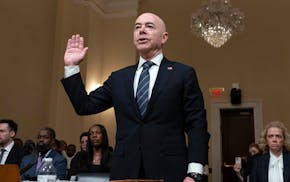Q: What is the IRS accused of doing, and why is it creating a political firestorm?
A: Lois Lerner, the head of the IRS office tasked with reviewing applications for tax-exempt status, acknowledged last week that the agency had given a greater degree of scrutiny to Tea Party-movement and other nonprofit conservative groups than to others in the months leading up to the 2012 elections. She said this in advance of a U.S. Treasury Department inspector general's report released this week.
The IRS is an independent agency feared for its sometimes-intimidating mandate and has a history of being used to harass political opponents. Tea Party groups often take the position that the federal government is too involved in daily life, so the added scrutiny tends to confirm their preconception.
There is apparently no evidence that liberal groups drew the same level of scrutiny. While President Obama has called the findings of the inspector general's report of the overreach "intolerable and inexcusable," congressional committees, sensing a possible scandal, have begun scheduling hearings.
Q: What is the purpose of the 501(c)(4) provision in the tax code?
A: Section 501(c) of the United States Internal Revenue Code provides that 28 types of nonprofit organizations are exempt from some federal income taxes.
Subsection (4) applies to two types of groups:
• Social-welfare organizations: Civic leagues or organizations not organized for profit but operated exclusively for the promotion of social welfare.
• Local associations of employees: the membership of which is limited to the employees of designated person(s) in a particular municipality, and the net earnings of which are devoted exclusively for the promotion of social welfare.
Q: Why does the IRS examine the claims of organizations seeking a tax-exempt status?
A: The short answer is to prevent fraud. Congress wants to prevent commercial interests from manipulating partisan politics through contributions to 501(c)(4) groups that should be subject to income taxes because they don't promote the general welfare but rather advance a partisan cause.
Q: What do these groups have to do with elections and politics?
A: The IRS says that 501(c)(4) groups "must operate exclusively to promote social welfare." But they are allowed to spend money on elections and lobbying as long as the primary activity of the group is promoting social welfare. So they can spend 51 percent of their time and money promoting social welfare and 49 percent on promoting candidates and issues. The test of whether an organization qualifies for the exemption is based on whether its educational activities are conducted in a nonpartisan manner, even when its dominant philosophy on issues is consistent with a political party with which it cannot be affiliated.
Q: What are some examples of 501(c)(4) groups?
A: The Sunlight Foundation, which monitors the influence of outside money on public policy, noted that Obama spun off his campaign organization, Obama for America, into a 501(c)(4) group called Organizing for America, which recently ran a media campaign to influence 13 members of Congress to support stronger background checks for gun purchases.
Last year, the IRS denied the status for the Democratic Party-leaning Emerge America for being too involved in partisan interests. Crossroads GPS, a 501(c)(4) founded by former George W. Bush political strategist Karl C. Rove and others, has had its tax-exempt status questioned by some Democrats and transparency advocates.
Q: How much money are these nonprofits spending on campaigns?
A: According to the Center for Responsive Politics, conservative groups spent more than $263 million in the 2012 campaign season. Liberal groups spent close to $35 million. An investigation by the Center for Public Integrity and the Center for Responsive Politics found that, in 2010, nonprofits outspent super PACs by a 3-2 ratio.
Q: What's the difference between a super PAC and these social-welfare groups?
A: The big difference is super PACs have to disclose donors and the 501(c)(4) groups do not.
Q: Why have 501(c)(4) applications increased recently?
A: In 2010, the Supreme Court's Citizens United decision made it possible for corporations and labor unions to raise and spend as much as they wanted on campaigns, and lifted restrictions on making those contributions to 501(c)(4) groups.
Scripps Howard
New Black congressional district in Louisiana bows to politics, not race, backers say
Trump trial jury selection process follows a familiar pattern with an unpredictable outcome
Climate change concerns grow, but few think Biden's climate law will help, AP-NORC poll finds
